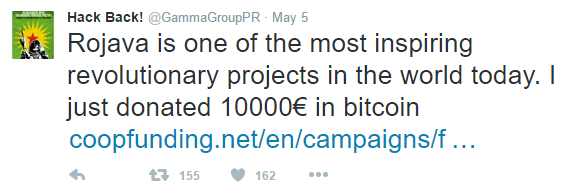Hacker sends $11,000 in stolen bitcoin to help Kurdish fighters against ISIS
 The hacker who claimed responsibility for the Gamma Group and Hacking Team breaches has sent $11,000 in stolen bitcoin to fighters fighting against ISIS in the northern Syrian region of Rojava, Ars Technica reported.
The hacker who claimed responsibility for the Gamma Group and Hacking Team breaches has sent $11,000 in stolen bitcoin to fighters fighting against ISIS in the northern Syrian region of Rojava, Ars Technica reported.
The hack goes under the pseudonyms “Hack Back!” and “Phineas Phisher.” He didn’t reveal the name of the targeted company, instead tweeting through his account @GammaGroupPR that he hopes there are a few more hacks on the way.
The donated money went to Rojava’s current CoopFunding campaign, running now through June 2nd. According to the campaign’s page, Rojava has been cut off from imports due to the current war and the embargo enforced by the region’s neighbors: Turkey, Iraq’s Kurdistan Region and the current frontlines of ISIS.
CryptoCoinsNews reported that the bordering Kurdistan Region is the location of a Kurdistan Workers Party (KWP) haven. The party has been named a terrorist organization by U.S. State Department. However, Rojava’s goal is to create a autonomous region complete with a self-sufficient economy.
Rojava’s economy relies on agriculture. The embargo has cut off imports of fertilizer, which is necessary to grow wheat, the region’s most important crop (only 10% of the fertilizer needed was imported this year). Donations from the CoopFunding campaign will go toward Rojava’s plan to grow its own fertilizer. The campaign has raised more than 56,000 USD at the time of this writing.
Portions of the plan include publishing educational materials about separating waste and building facilities to make the fertilizer.
Rojava’s efforts for autonomy have sparked different reactions from the international community. The U.S. doesn’t recognize the autonomy of Rojava, as stated by US State Department Spokesman John Kirby when he spoke to Reuters earlier this year. Raymond Joliffe, member of the House of Lords in the United Kingdom, called the region’s efforts a unique experiment that “deserves to succeed.”
The hacker also told Ars Technica that another goal of the donation was to draw attention to the region, which he said was often reduced to gimmicky articles.
Image credit – Public domain image by Mike Cauldwell










